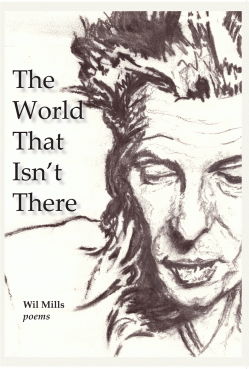"Language is intimately involved in all of Wil Mills’ poems, language as sacred portal to the world, as both mediation and impediment. What Mills offers so compellingly is the human experience of faith, not the articles of faith, the tension between the imperatives of faith and of personal experience. That view of faith stands back of his marvelous play with words, his punning, which in his hands is deadly serious as well as seriously funny. There’s nothing doctrinaire about Mills’ poetry, or dogmatic. To me that makes all the difference, and makes the book available and maybe even necessary to nonbelievers."
— Alan Shapiro
"In The World That Isn’t There, Wilmer Mills’ luminous posthumous collection of poems, praise and satire, prophecy and valediction turn out to share a family resemblance. This kinship isn’t merely a matter of Mills’ flawless formal control and grace. Rather, the ache, the mingled despair and hope which inflect Mills’ reading of all experience from roadside restaurants to crosswalks to birds crashing into panes of glass, suffuse every poem here; and thus these poems enable us, Mills’ beneficiaries, 'to read/the symbolled wonders signaled in the world' through the poet’s eyes. Which world — the world that isn’t there or the world that is? Perhaps, the poems suggest, the two worlds are finally one."
— Rachel Hadas
“Wil Mills consistently does things I have not seen done before, or not seen done so brilliantly: a wordplay spun into a metaphysical vision, with perfectly apt imagery along the way; a compressed summing up of a whole range of experience in a few words, abstract or concrete; a bit of culture-critical grotesqueness worthy of Flannery O’Connor. Here is an example of how Mills picks up 'found' allegories by the roadside: after a number of examples, the series climaxes with 'And now a city crosswalk sign reminds me/To ‘Walk With Light!’' In another poem, Mills says about his children that they 'could see the world that isn’t there.' This statement applies with equal justice to himself.”
— Raymond Oliver
“William Butler Yeats eulogized Robert Gregory as 'our Sidney and our perfect man,' and that same memorial characterization could be justly applied to Wil Mills. Like Sidney and Gregory, Mills died far too young, but not before excelling in many arts, practical and fine alike, including music, painting, carpentry and, above all, poetry. This volume offers a fine sampling of his previously published poems as well work that now appears for the first time.”
— Timothy Steele

Order from:
-
Amazon.com
-
Barnes & Noble
-
Powell's Books
WIL MILLS, the son of agricultural missionaries, grew up in Brazil and Louisiana. After earning his BA and MA in theology from the University of the South, he worked at a variety of jobs, including carpenter, sawmill operator, and baker. He also served as the Kenan Visiting Writer at the University of North Carolina at Chapel Hill, and as the Writer-in-Residence at Covenant College in Chattanooga. His poetry was published in Poetry, The New Republic, The Hudson Review, The New Criterion, and many other journals, and his debut collection, Light for the Orphans, was published in 2002. Until his death in 2011, he lived in Tennessee with his wife Kathryn and their two children, Benjamin and Phoebe-Agnès, first in a house that he built himself in Sewanee, then, later, in Chattanooga.